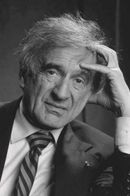Elie Wiesel, a renowned writer and human rights activist, was born on September 30, 1928, in the Kingdom of Romania. Following World War II, he emigrated to the United States, where he would go on to make a profound impact on the world.
As a survivor of the Holocaust, Wiesel's work often revolves around this traumatic experience, shedding light on the atrocities that occurred during this dark period in human history. His literary endeavors have earned him widespread recognition, including the Congressional Gold Medal in 1985, the highest honor bestowed by the U.S. Congress.
The Nobel Peace Prize, awarded in 1986, is a testament to Wiesel's unwavering dedication to human rights. His tireless efforts to promote justice and compassion have taken him to various parts of the world, where he has advocated for the rights of marginalized groups, including Soviet and Ethiopian Jews, Nicaragua's Miskito Indians, Argentina's Desaparecidos, Cambodian refugees, and the victims of war in former Yugoslavia.
Throughout his illustrious career, Wiesel has been a vocal supporter of the state of Israel and a powerful witness to the Shoah. He has also spoken out against apartheid in South Africa, genocide in Bosnia, and the crisis in Darfur, Sudan, consistently calling for international intervention in these pressing matters.
Today, at nearly 80 years of age, Elie Wiesel remains a prominent figure in the academic and literary communities. As the Andrew Mellon Professor of the Humanities at Boston University, he continues to teach, write, and deliver public speeches, inspiring new generations to follow in his footsteps and strive for a more just and compassionate world.
























